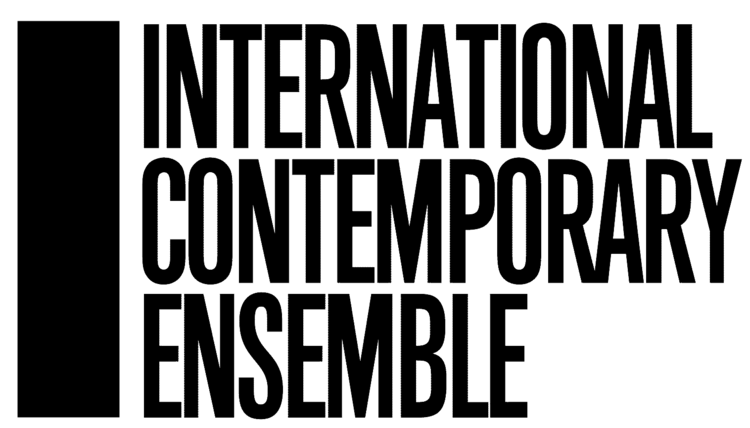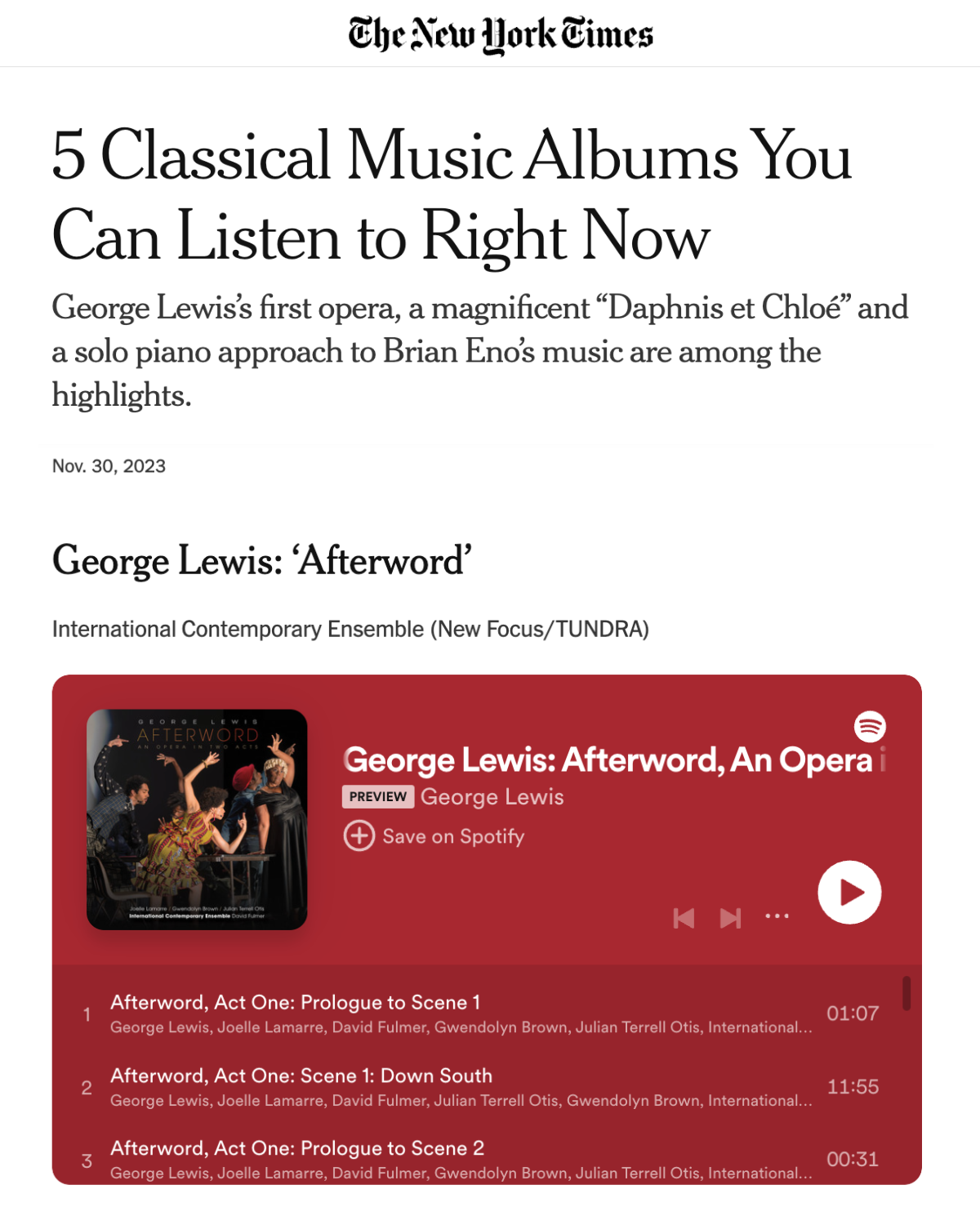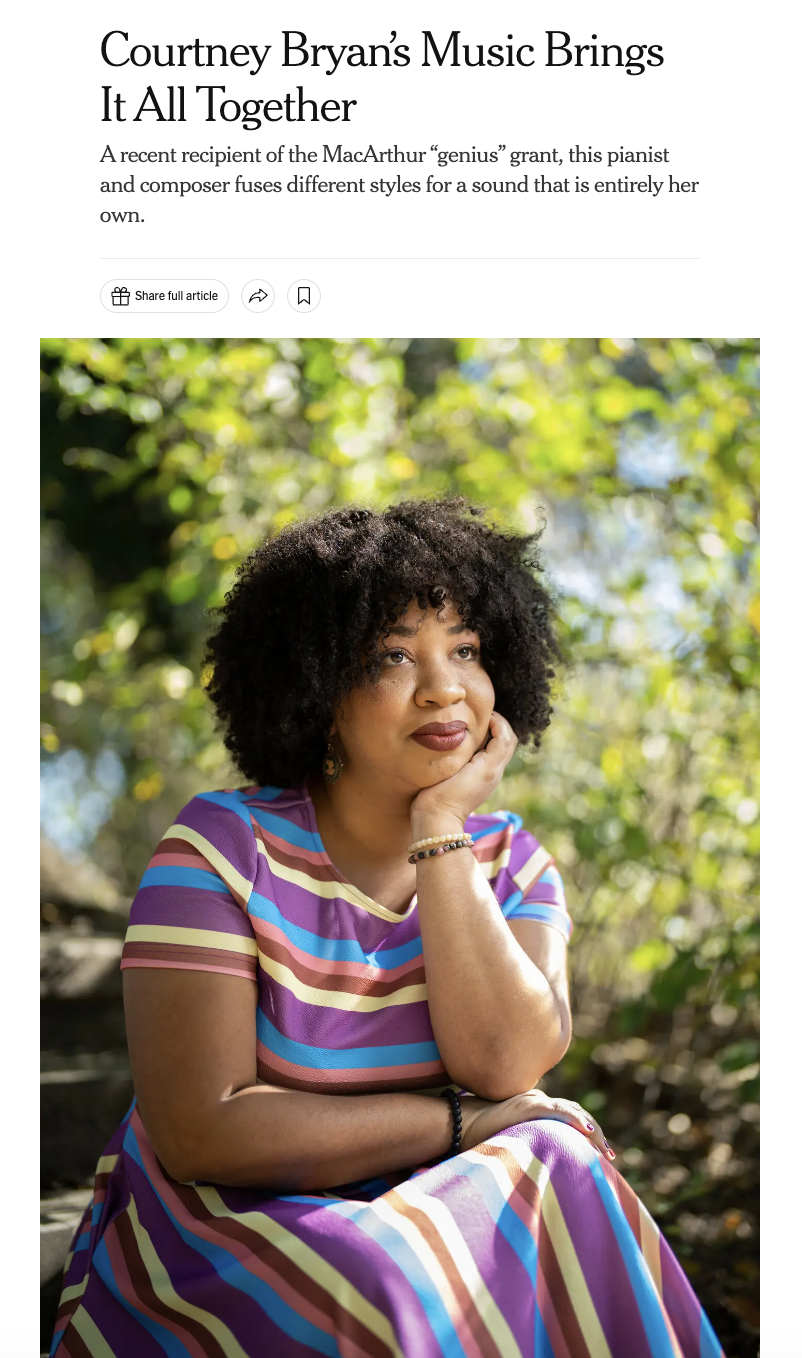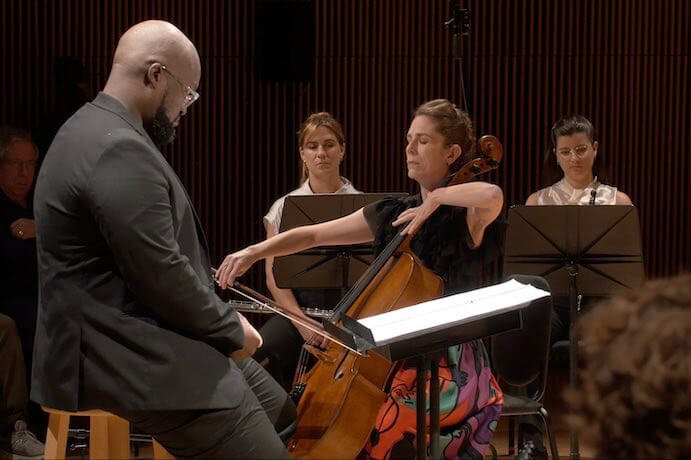New York, NY (July 13, 2023) — International Contemporary Ensemble kicks off its 2023-24 season with a performance at the TIME:SPANS Festival on Friday, August 25, 2023 at 7:30 p.m. at the DiMenna Center for Classical Music, with the US premiere of a work by Andile Khumalo, as well as works by Wadada Leo Smith, Younghi Pagh-Paan, and Aida Shirazi. The Ensemble performs two concerts at Roulette - a George Lewis Portrait Concert on Thursday, October 5, 2023 at 8:00 p.m. and the world premiere of Yvette Janine Jackson’s new radio opera for large ensemble and electronics on Friday, January 19, 2024 at 8:00 p.m. The Ensemble also collaborates with Japanese performer/composer/poet/visual artist Tomomi Adachi for three performances exploring the music of John Cage at the Japan Society this season: Saturday, October 21, 2023 at 8:30 p.m., Thursday, November 16, 2023 at 7:30 p.m. and Thursday, December 7, 2023 at 7:30 p.m. International Contemporary Ensemble presents an Afromodernism program featuring two world premieres by Rome Prize-winning composer Courtney Bryan and Adegoke Steve Colson on Wednesday, November 1, 2023 at 7:30 p.m. at Merkin Hall, and gives the US premiere of George Lewis’s Blombos Workshop (2020) on Monday, December 18, 2023 at 7:00 p.m. at the Park Avenue Armory. The Ensemble returns for the Composer Portraits series for works by pioneering German composer Carola Bauckholt on Thursday, February 8, 2024 at 8:00 p.m. at Miller Theatre. In an additional highlight, the Ensemble reunites with composer, visual artist, and multi-instrumentalist Douglas R. Ewart for a new collaboration with Glasgow Improvisers Orchestra for GIOfest in Glasgow, Scotland.
Artistic Director George Lewis calls this season “Polyaspora, Year One.” He said, “As our Ensemble enters its 21st year, finding the sound of the polyaspora assumes a planetary perspective. Leaving fixed genre labels behind, our polyaspora is intercultural, intermedial, and interdisciplinary, our polyaspora is conscious, collaborative, creolized, and connected. ‘International’ situates us in a cosmopolitan musical space; "contemporary” leads us to embody a mosaic identity; and “Ensemble” means that we work to build new transnational communities through sound.”
On Friday, August 25, 2023 at 7:30 p.m. at the DiMenna Center for Classical Music the TIME:SPANS Festival presents International Contemporary Ensemble in an evening that exemplifies its concept of Polyaspora, including two premieres: the US premiere of Invisible Self by Andile Khumalo, who has been named one of the top five South African composers by BBC Music Magazine and one of the top 23 composers and performers to watch in 2023 by The Washington Post; and the NY premiere of Gondwana: Earth, a Blue Sanctuary, Oceans, Seas, Lakes, Rivers, Springs and Lagoons; Paradise Gardens and Skies by American composer Wadada Leo Smith, “one of the most celebrated new music composers of this young century” (Down Beat). Also on this exciting and diversely creative program are works by internationally renowned contemporary Korean-German composer Younghi Pagh-Paan and emerging Iranian composer Aida Shirazi, whose work has been described as “affecting” by The New Yorker.
On Thursday, October 5, 2023 at 8:00 p.m. the Ensemble gives its first performance at Roulette of the season with a George Lewis Portrait Concert that includes the US premiere of H. narrans (2020) for voice and chamber ensemble, with text drawn from the writings of postcolonial theorist Sylvia Wynter. The next Roulette concert on Friday, January 19, 2024 at 8:00 p.m. features the world premiere of Yvette Janine Jackson’s new radio opera for large ensemble and electronics, commissioned by the Ensemble and funded by the Ernst von Siemens Music Foundation. Jackson’s radio operas combine music, dialogue and effects to stimulate audience imagination and initiate conversations. This radio opera, inspired by Augusto Boal's book “Theatre of the Oppressed,” addresses the environmental and socioeconomic impact of space travel and space tourism on people living near rocket launch sites and test ranges. Jackson’s music physically places the audience in the middle of the narrative through the use of multi-channel surround sound, while the libretto is constructed using found text from myriad sources–news articles, anecdotes, live streams, or corporate websites. The spoken words themselves may be digitally edited or covered by other instruments, and sounds that are sung may have no particular semantic meaning. Rather than prescribing fixed meanings, this work invites the audience to draw upon personal experience and knowledge to co-construct its narrative.
The Ensemble also collaborates with performer/composer/poet/visual artist Tomomi Adachi on three events celebrating John Cage’s relationship with Japanese culture, presented by the Japan Society this season. On the first concert, on Saturday, October 21, 2023 at 8:30 p.m., John Cage’s Ryoanji will be performed telematically, as members of the Ensemble (Michael Lormand, trombone; Lizzie Burns, double bass; Clara Warnaar, percussion) perform alongside musicians playing live in Japan - Hitomi Nakamura on the hichiriki, the ancient double-reed woodwind, and Maki Ota on vocals - streamed into the theater from a tea house in Kanazawa City, Japan. The performance will be accompanied by a captivating backdrop of hypnotic 3D visuals depicting the raked sand of the Zen garden created by Dr. Tsutomu Fujinami, a researcher at the prestigious Japan Advanced Institute for Science and Technology. A lecture on the origins of Cage's fascination with Japanese culture and how those interests manifest in Ryoanji, led by John Cage scholar James Pritchett, precedes the performance.
In the second concert on Thursday, November 16, 2023 at 7:30 p.m., Adachi brings John Cage’s unrealized project, Noh-opera: Or the Complete Musical Works of Marcel Duchamp, to life in a world premiere performance. Cage envisioned a premiere in Japan, but not enough of the work was ever finished to be staged. In response to this dream project, Adachi freshly imagines the work into existence by seamlessly integrating captivating aspects of western opera and noh. Adachi's artificial intelligence-written music and lyrics for the work are based on the confounding paradoxes found in Zen Buddhist koans, succinct but open-ended riddles on the human condition. The performance features the distinctly unique voice of Gelsey Bell (recognized as the “future of experimental vocalism” by The New York Times), renowned Japanese noh actor Wakako Matsuda, and five wind instrumentalists from the International Contemporary Ensemble.
The final concert presented by the Japan Society on Thursday, December 7, 2023 at 7:30 p.m. presents a
collaboration with experimental sound artists Tania Caroline Chen and Victoria Shen and featured artist Tomomi Adachi that recreates the essential works performed at John Cage's historic visit to Japan in 1962, often referred to as the "Cage Shock." The evening includes a string quartet of Josh Modney (violin), Kyle Armbrust (viola), Wendy Richman (viola), and Michael Nicolas (cello), all musicians from the International Contemporary Ensemble, performing Sapporo (1962) by Toshi Ichiyanagi (1933-2022), the esteemed Japanese composer and first husband of Yoko Ono. A pre-concert lecture will be delivered one hour prior to the start of the show by musician and Cage scholar James Pritchett.
On Wednesday, November 1, 2023 at 7:30 p.m. at Merkin Hall, International Contemporary Ensemble presents an Afromodernism program featuring two world premieres – the first, a new work by Rome Prize-winning composer Courtney Bryan in honor of the 50th wedding anniversary of Arlene and Larry Dunn (who also commissioned the piece), inspired by Sounds of Freedom, and the second by Adegoke Steve Colson (commissioned by the Fromm Music Foundation), a longtime member of the famed Association for the Advancement of Creative Musicians. Colson’s piece, MIRRORS, presents thoughts concerning the human condition in the hopes of stimulating listeners to reflect on the current state of American society and the divisions and turmoil that we witness on a daily basis. Conducted by Vimbayi Kaziboni, the program reveals the new Afromodernism as an intercultural, multigenerational space of innovation. Additional works include Runagate, Runagate, Wendell Logan’s classic 1989 work for tenor and chamber ensemble, and Thread and Pull by the intermedia composer Brittany J. Green.
Later in November, International Contemporary Ensemble members Rebekah Heller (bassoon), Wendy Richman (viola), Nathan Davis (percussion), and Clara Warnaar (percussion) reunite with composer, visual artist, and multi-instrumentalist Douglas R. Ewart in collaboration with the internationally acclaimed Glasgow Improvisers Orchestra (GIO) for the 2023 edition of the annual international GIOFest, which takes place from November 23-25, 2023 at the Centre for Contemporary Arts in Glasgow, Scotland. Like the Ensemble, GIO emphasizes “community and diversity - both our local community and the wider global community of experimental music that we’re proudly part of.”
International Contemporary Ensemble joins Artistic Director George Lewis on Monday, December 18, 2023 at 7:00 p.m. at the Park Avenue Armory for the US premiere of his Blombos Workshop (2020) for piano, which engages postcolonial theorist Sylvia Wynter’s celebration of the human, and Assemblage (2013) for nonet, which explores in musical form the practice of assemblage—artmaking that recombines and recontextualizes collections of natural and human-made objects. Performed as part of the AACM’s year-long Artists Studio residency, these Lewis works are performed by members of the Ensemble on a special double bill with the music of Amina Claudine Myers.
Returning for the Miller Theatre’s annual Composer Portraits series, the Ensemble performs a program of works by pioneering German composer Carola Bauckholt on Thursday, February 8, 2024 at 8:00 p.m. The selection of works spans 20 years, anchored by Oh, I See, written for clarinet, violin, cello, video, and two balloons. Bauckholt’s work focuses on the phenomena of perception and understanding, and her music blurs boundaries between visual arts, musical theater, and concert music.
ABOUT OUR 2023-2024 COMMISSIONED ARTISTS
ADEGOKE STEVE COLSON



































